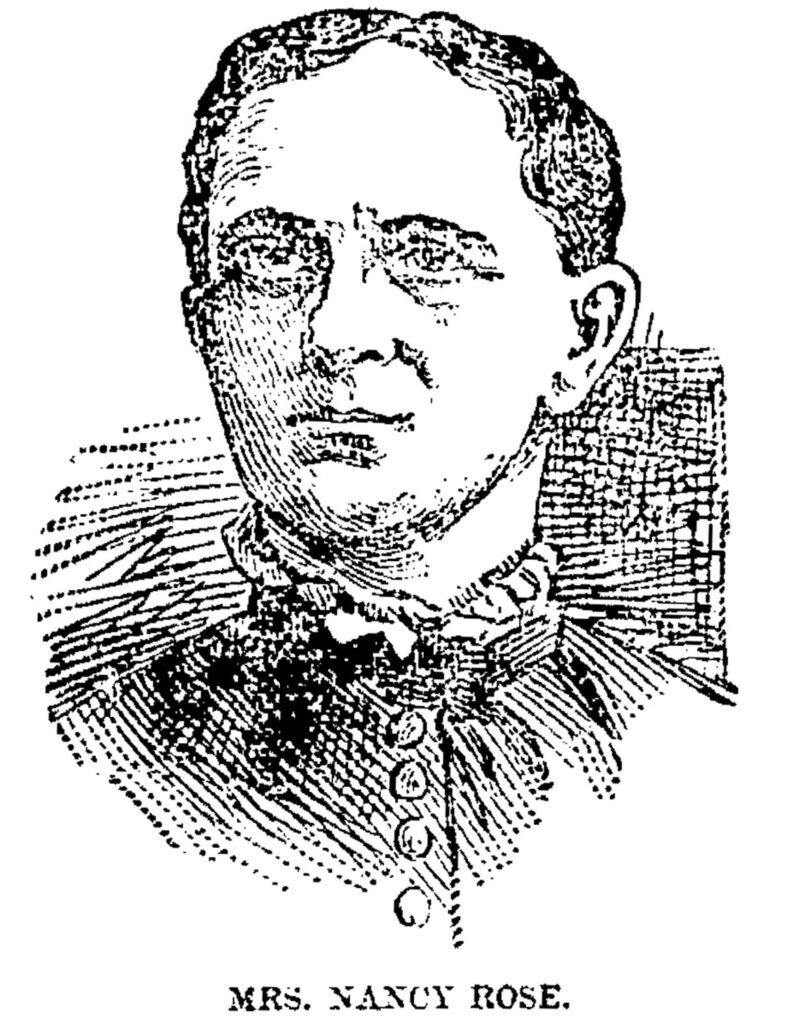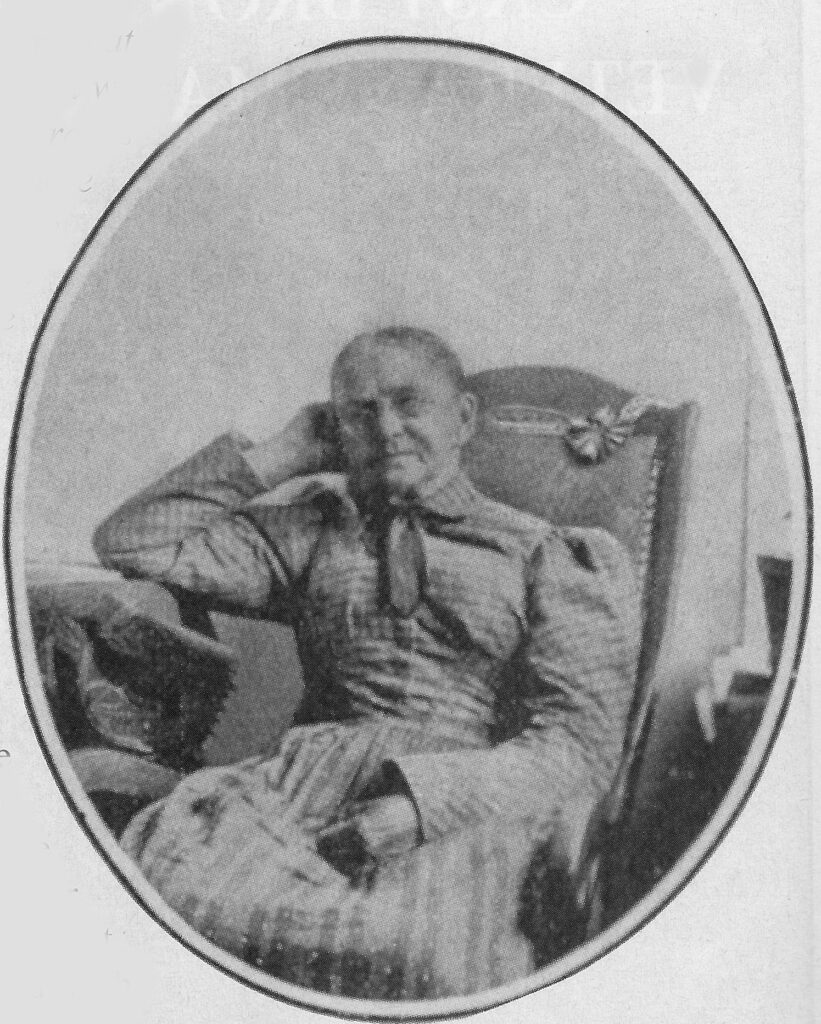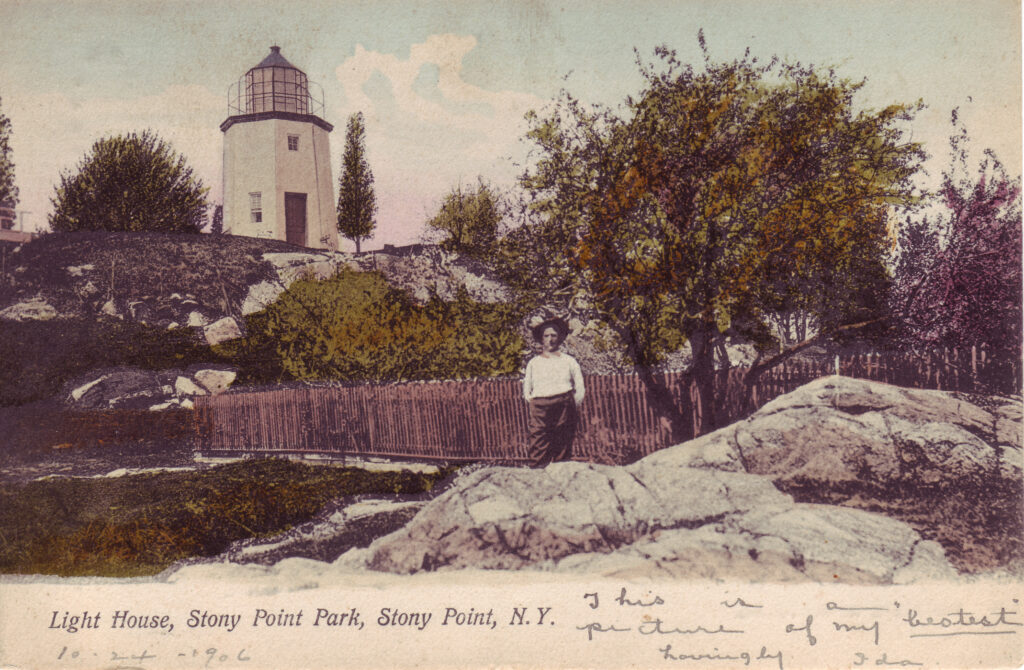
Captain Joshua K. Card reporting from Light Station Portsmouth Harbor, New Hampshire. Today I want to tell you about a female light keeper over New York way whose career overlapped with mine. Nancy Rose was the faithful keeper at Stony Point on the Hudson River for more than a half century.
Stony Point, a small peninsula on the west side of the Hudson River about twenty-five miles north of Manhattan, is best known for its historic battlefield. The Battle of Stony Point was fought on July 15–16, 1779, when Continental troops led by Brigadier General “Mad” Anthony Wayne marched south from West Point and captured a British garrison in a surprise late-night attack.

U.S. Lighthouse Society archives.
Congress appropriated $4,500 for the Hudson River’s first lighthouse in 1824. An octagonal stone lighthouse was built at Stony Point along with a small stone dwelling. The new light went into service on December 1, 1826, not long after the opening of the Erie Canal had led to increased traffic on the Hudson.
Alexander Rose arrived as the keeper in 1852. After he assumed his duties at the station, Rose also continued to serve as the county coroner. In 1856, Rose was helping to carry lumber for the construction of a new fog bell tower when he ruptured a blood vessel. He died just a few weeks later, and his widow, Nancy, became the new keeper. Nancy Rose’s great grandfather had been wounded in the Battle of Stony Point.

Along with her extensive lightkeeping duties, Nancy Rose was faced with the task of raising six children by herself. Only two of her six children, Melinda and Alexander, reached adulthood.
It was reported that on one occasion in the 1890s Nancy remained at her post for 56 hours straight, sounding the fog bell at 30 second intervals during a thick fog when the automatic striking machinery malfunctioned.
For the most part, the general state of things at bucolic Stony Point was a sameness that bordered on dullness. “Nothing ever happens up here,” Mrs. Rose was quoted in a 1903 article in the New York Tribune. “One year is exactly like another, and except for the weather, nothing changes.” Her daughter, Melinda, resoundingly echoed these sentiments: “I can’t remember anything that has ever happened, except once our cow died, and several times it’s been bad years for the chickens.”
Nancy’s son Alexander, when asked if he wanted to become keeper, replied, “I’d rather pick huckleberries over the mountain for a living.” Alexander Rose went on to become one of the area’s leading brick manufacturers and town supervisor of Stony Point.
Nancy Rose received nothing but glowing reports from lighthouse inspectors during her tenure, and the Tribune called the station “exquisitely clean.” But things got rather difficult for Rose toward the end of her stay, after the establishment of a state park at Stony Point. In addition to her regular duties, including the maintenance of a second light that had been added on the bell tower in 1902, the keeper was expected to provide tours of the light station for tourists.

An intruder rudely shattered the dull routine in June 1903, when Nancy Rose was 79 years old, as described in a contemporary newspaper:
Mrs. Nancy Rose . . . is the heroine of a combat in the historic lighthouse at Stony Point on the Hudson, in which she was pitted against a lunatic. Armed only with a poker, the woman, who . . . has attended the lighthouse half a century, bravely stood her ground and drove back her assailant. . . . He climbed into the tower, and exclaiming that the light must be torn down, started to demolish things. Mrs. Rose seized a poker and belabored him. He stood the rain of blows a moment and then fled, locking the door as he went. The old lady sounded the fog bell and secured aid.
The stresses of age and added duties, and perhaps her scuffle with the mysterious intruder, contributed to Nancy Rose’s decision to retire in 1903. She never had the chance to enjoy life away from the lighthouse as she died the following year.

A fitting epitaph for Nancy Rose was penned in 1896 by an anonymous newspaper reporter, who wrote, “For nearly 40 years she has been found at her post of duty, with calm, quiet courage doing the task that has been set her—a lonely, thankless task, under dark or starry skies, in clear or stormy weather.”

Rose’s fifty-three-year-old daughter Melinda, long an unofficial assistant, took over for a while. When she resigned in 1905, Melinda Rose cited the low pay ($560 per year) and loneliness at the station in the winter. In a statement for the Stony Point Battlefield State Historic Site, Melinda later wrote, “We were at the lighthouse 53 years. In all that time there were no deaths or accidents. That speaks of faithful and conscientious service in keeping the old light burning and in ringing the warning bell in time of danger.” Frank Guyette of Vermont, a Civil War veteran, succeeded Melinda Rose as keeper in late 1905.

Jeremy D’Entremont is the author of more than 20 books and hundreds of articles on lighthouses and maritime history. He is the president and historian for the American Lighthouse Foundation and founder of Friends of Portsmouth Harbor Lighthouses, and he has lectured and narrated cruises throughout the Northeast and in other regions. He is also the producer and host of the U.S. Lighthouse Society podcast, “Light Hearted.” He can be emailed at Jeremy@uslhs.org

